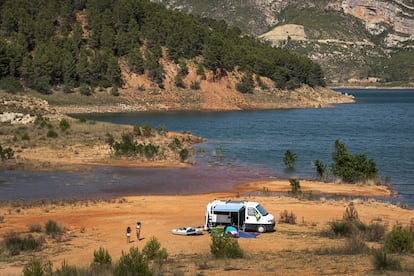Coronavirus concerns fuel motorhome boom in Spain
Sales and rentals of RVs are rising as people seek a more socially isolated way to spend their vacation
Celia had her motorhome parked at El Saler beach in Valencia last week. Like many others, she started out by pitching tents at campsites, then graduated to towing a caravan, and now owns a fully integrated home on wheels with the kitchen, bathroom and bedroom at hand. “You don’t have to have any contact with anyone if you don’t want to,” she says. “That’s why I think it’s the safer option right now, although we’ve been keen on it for a long time.”
There has been a remarkable boom in the sale of motorhomes in Spain over the last five years, but this year they were being snapped up at the rate of 25 units a day, despite an average price tag of €55,000. A cheaper option is to buy a smaller camper van or to convert a regular van into one, a market that has also grown considerably.
When the coronavirus lockdown came into force in mid-March, there was a hiatus in sales mirroring the slump in the car and tourism sectors, but demand has bounced back stronger than ever and in June there was a 20% increase in sales from the previous year, with 1,208 new motorhomes on the road, according to the Spanish Association of Caravan Industry and Commerce (Aseicar).
In the rental market, demand matches that of previous summers, with few of the 5,500 available vehicles still up for grabs. The main difference is that bookings are now stretching into September, October and November, as employees on furlough due to the pandemic gradually return to work and summer breaks are delayed until the fall.
Some seasoned motorhome holidaymakers say they have noticed a hike in rental prices at some companies, which are charging more than the usual €140 to €200 a day. But José Manuel Jurado, president of Aseicar, says this is not the case among association members.
“Of course, with the pandemic and the complex situation, we have benefited from the fact that motorhomes allow you to travel independently, avoiding large crowds and a lot of social contact,” he says. “There are people who are just now showing an interest in this form of travel, but it is also true that a lot of fuss is being made about it when, in fact, demand has been growing for years. There are still vehicles to rent and those of us working at one of [Aseicar’s] 140 associated companies are trying not to take advantage of the situation, and we have not seen a rise in prices.”
There are 60,000 motorhomes, 10,000 camper vans and 230,000 caravans in Spain. In countries with a longer tradition of this kind of tourism, such as France and Germany, motorhomes can number as many as half a million, with 4,500 and 6,000 service areas available for these vehicles respectively, compared to 1,000 such areas in Spain. “We have come a long way,” says Jurado. “In 2010, there were only 185 areas, but there are still many cities and municipalities that do not recognize the growing importance of this kind of tourism.”
The pandemic has drastically reduced the presence of foreign motorhome tourists who usually account for around 50% of the service area and campground clients. But there are always exceptions. In Bétera’s motorhome park, a German national named Torsten and his family have just resumed their 12-month tour of Europe after it was interrupted by the lockdown and are en route to the Portuguese beaches to surf.

Despite the pollution from fuel, the president of the Spanish Federation of Motorhome Associations, José Luis Quintero, maintains that it is a safe and ecological tourism model. “I take my solar panels for electricity and the car engine also feeds the battery,” he says. “We appreciate rest areas with water hookups and dump stations for grey water [from showers and dishwashing] and black water [for toilets].”
Motorhomes are mainly used for tourism, but they are also regular homes to those seeking an alternative lifestyle. Borja, for example, experimented with this way of life when he went fruit picking in France, and set up a kitchen and bed in his Berlingo van; he now lives with his partner Claudia in a camper truck, which they take to work.
“In Europe, a lot of young people live like this,” he says, while Claudia emphasizes the anti-establishment aspect of their choice. “We have more freedom of movement, and at least we don’t participate in the real estate system,” she says. “Although we can’t avoid putting fuel in the tank, of course.”
English version by Heather Galloway.
Tu suscripción se está usando en otro dispositivo
¿Quieres añadir otro usuario a tu suscripción?
Si continúas leyendo en este dispositivo, no se podrá leer en el otro.
FlechaTu suscripción se está usando en otro dispositivo y solo puedes acceder a EL PAÍS desde un dispositivo a la vez.
Si quieres compartir tu cuenta, cambia tu suscripción a la modalidad Premium, así podrás añadir otro usuario. Cada uno accederá con su propia cuenta de email, lo que os permitirá personalizar vuestra experiencia en EL PAÍS.
¿Tienes una suscripción de empresa? Accede aquí para contratar más cuentas.
En el caso de no saber quién está usando tu cuenta, te recomendamos cambiar tu contraseña aquí.
Si decides continuar compartiendo tu cuenta, este mensaje se mostrará en tu dispositivo y en el de la otra persona que está usando tu cuenta de forma indefinida, afectando a tu experiencia de lectura. Puedes consultar aquí los términos y condiciones de la suscripción digital.









































